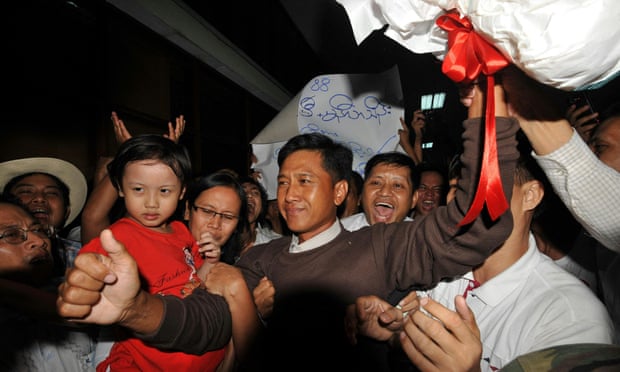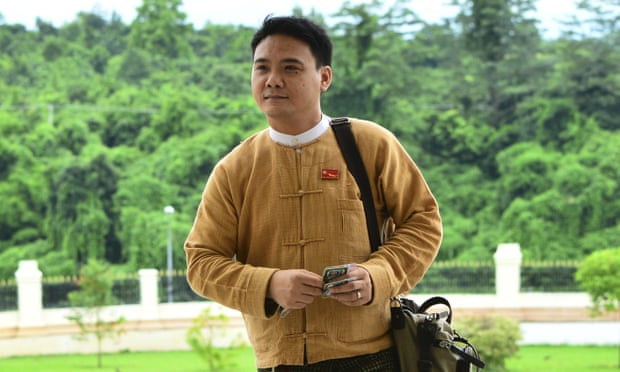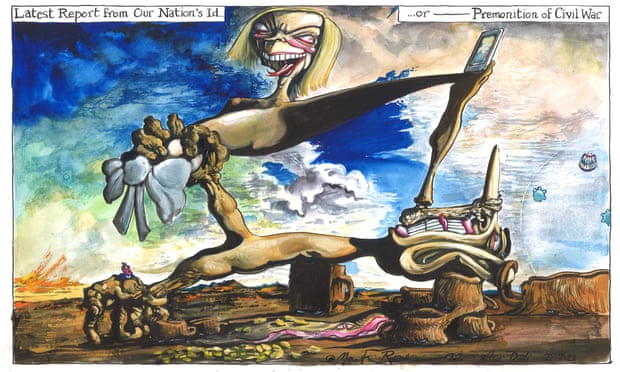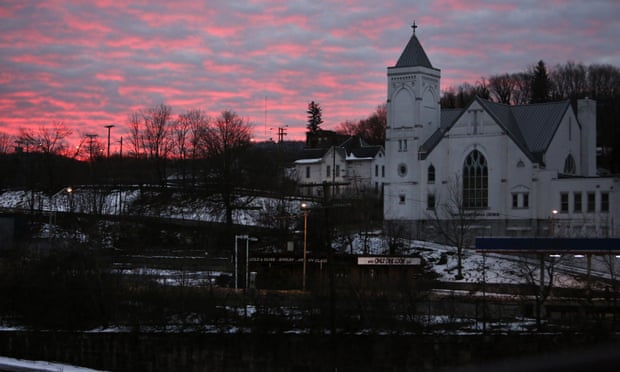[ad_1]
Good morning. On 1 February last year, Myanmar’s military, the Tatmadaw, staged a coup in the middle of the night, detaining Aung San Suu Kyi and many other leading figures from the country’s ruling party. Military television said the army had taken charge for one year in response to electoral fraud. Eighteen months later, the junta is still in power, almost 12,000 people are in detention and more than 2,000 have been killed.
This week, the military executed four prisoners, including a former politician and a veteran activist, in the first use of capital punishment in decades. For many in the west, the end of Myanmar’s spell of quasi-democracy was a brief moment of dismay. But these executions are only the latest signal of the regime’s ongoing status as among the most oppressive and ruthless in the world.
Last night, the Guardian reported that “the familiar, defiant sound of clashing pots and pans” – a nightly symbol of resistance after last year’s coup – had returned to the streets of Yangon. For today’s newsletter, I spoke with Aung Naing Soe, an exiled Burmese journalist and Guardian contributor, about his country’s path to this point – and why, even with so much bloodshed, the executions could signal a new phase in the struggle for democracy. Here are the headlines.
Five big stories
-
Coronavirus | Ministers played “fast and loose” when awarding £777m in Covid contracts to a healthcare firm that employed Conservative MP Owen Paterson as a lobbyist, the head of parliament’s spending watchdog has said.
-
Strikes | The railways will again grind to a halt on Wednesday as workers strike over pay, job security and working conditions. Union leaders rejected a “paltry” offer of a 4% pay rise for the remainder of 2022.
-
Politics | Rishi Sunak has made a dramatic U-turn by promising to scrap VAT on household fuel bills for a year if he becomes prime minister. He set out the policy after the second Tory leadership debate ended abruptly when presenter Kate McCann fainted.
-
Oil | 27 EU member states have agreed on a plan to ration natural gas this winter to protect themselves against any more supply cuts by Russia.
-
Sri Lanka | Former president Gotabaya Rajapaksa, who fled the country after mass protests over economic mismanagement, is expected to return home, according to a cabinet minister. Rajapaksa has been in Singapore since he was forced out of office but has not applied for asylum.
In depth: ‘Another turning point in Myanmar’s brutal system’

Aung Naing Soe has covered Myanmar for most of his adult life. In 2017, when he was 27, he received a two-month prison sentence for operating a drone near parliament. It was during the decade-long period in which the Tatmadaw partially ceded power, when civilian leaders like Aung San Suu Kyi were elected but the army retained control in many areas.
More recently, Aung has reported for the Guardian in exile under the pseudonym Maung Moe. A recent change in his circumstances has allowed him to use his real name, and he is credited as an associate producer on a remarkable new Channel 4 documentary, Myanmar: The Forgotten Revolution.
Aung Naing Soe was “heartbroken” as he interviewed activists at home about this week’s executions, he said. “It’s the same old shit. But it’s like it’s speeding up. Maybe it is another turning point in this brutal system.”
Why did Myanmar’s coup happen?
From the early 2010s, Myanmar operated under a kind of “conditional democracy”, where Aung San Suu Kyi’s National League for Democracy (NLD) won landslide victories but the Tatmadaw retained key ministries, had guaranteed parliamentary seats, and held veto power on constitutional change. Aung San Suu Kyi was internationally criticised for her complicity in the ethnic cleansing of the country’s Rohingya minority – but she remained hugely popular at home. After a huge electoral victory for the NLD in 2020, the Tatmadaw appears to have seen a new threat to its position, and its leaders decided to act. (You might remember this surreal video taken just as the coup began.)
When protests started, “there was no crackdown at first,” said Aung Naing Soe. “Doctors, railway workers, bankers, teachers, they were all showing their disobedience peacefully. But then the military started to use live rounds.” On 3 March, at least 38 people were killed when security forces opened fire on protesters across the country.
What’s happened since?
After that sharp escalation in violence, said Aung Naing Soe, “the protesters realised they had to protect themselves. They got tactical armour, they were making sandbags and shields.” Rights groups documented tens of thousands of human rights abuses and what many independent observers say are crimes against humanity.
Unarmed demonstrators have been shot dead in the street, villages have been burned to the ground or fired on by military aircraft, and rape or arbitrary detention have been visited on thousands more. The UN special rapporteur on human rights in Myanmar, Tom Andrews, says scores of children have been killed – not caught in the crossfire but targeted to subjugate the junta’s opponents.
Meanwhile, as major protests have given way to flashmobs, a remarkable armed uprising has taken shape, with many “Gen Z protesters escaping into the jungle and receiving training”, Aung Naing Soe said. The patchwork of militia forces, known as People’s Defence Forces (PDFs), that has arisen is comprehensively outmatched by the Tatmadaw, but with the help of armed ethnic groups who have fought for autonomy for many years, they have carried out effective guerilla attacks on the military and police.
Aung Naing Soe’s sister was one of those Gen Z protesters. One source of their power, he said, is their determination and morale, in part the result of the ability to “turn everything into jokes. My sister was 23. She spent time in prison in interrogation. It was so unbelievable to me – they make memes out of everything, they will make jokes on the frontline against a fighter jet. There are millions like my sister, ready to sacrifice everything.”
Why are these executions significant?
Against this backdrop, the execution of four men might seem like a relatively minor development. But the killings are the first use of capital punishment in more than 30 years. The men were sentenced without any kind of due process. The military’s willingness to take such a step is also ominous given at least 76 prisoners, including two children, have been sentenced to death since the coup.
Perhaps most significant for the wider struggle is the fact that two of the victims (Rebecca Ratcliffe has more about all four here) were prominent opponents of the regime. Kyaw Min Yu (above), known as Ko Jimmy, was a 53-year-old veteran of the 1988 uprising who spent 21 years in prison; Phyo Zeya Thaw (below), 41, was a former politician and hip-hop artist who helped to found Generation Wave, an anti-military youth movement.

Zachary Abuza, a US expert on the region, told the New York Times that the executions revealed that the junta was desperate to show its strength. But he added: “In Ko Jimmy and Phyo Zeya Thaw, the junta has created two tailor-made and beloved martyrs.” Aung Naing Soe agreed. “They are the people’s heroes,” he said. “Millions are ready to follow in their footsteps.”
What happens next?
On Monday, the US called on China – Myanmar’s most powerful ally – to act to rein in the junta. China repeated its usual formulation that it does not interfere in other countries’ affairs. The world has done little to intervene since the coup, and with international attention on Ukraine and a global economic crisis, there is no serious sign of that changing.
In the absence of international intervention, the executions nonetheless feed a sense that both sides are “at the end of the road”, Aung Naing Soe said. The scale of the opposition and success of the PDFs’ actions against them have contributed to a sense that “the military have lost respect, power, money, everything. They are ashamed. They realise the situation is now, you take it all or you die.”
On the other side, disdain for the Tatmadaw has become remarkably open and widespread. Min Aung Hlaing, the military commander in chief, is nicknamed “motherfucker” (a pun on his initials in Burmese). “Even older women call him this, and women in Burma do not curse. Both sides know a final confrontation is coming.”
If so, it may not be immediate. Phil Robertson, deputy Asia director at Human Rights Watch, told the Channel 4 documentary: “Neither side can administer the knockout blow, so it is going to be a grinding, bloody mess.”
When he considers that prospect, Aung Naing Soe reflects on an interview he just conducted with an opposition MP. “There’s a saying we have – ‘I’m water in your palm’: you can drink it or throw it away, it’s up to you. And he said to me – and it gave me goosebumps, it motivated me to keep working: ‘We are not water in their palm. We are shattered glass. And even though we are shattered, we are still capable of bringing justice. However they hold us, their hands will bleed.’”
What else we’ve been reading
-
Oliver Wainwright examines the history of Balfron Tower in east London. Wainwright describes how a tower block designed by a Marxist architect for working-class residents has become another social housing enterprise that’s been gutted and sold off to the highest bidder. Nimo
-
Tom Ambrose’s account of a Ukrainian woman’s battle to build a new life in Britain is a portrait of the alienation that can accompany escape. “If I had come to London a year ago, I would have been mesmerised by its beauty and architecture but now I feel nothing,” she says. “The world is just grey.” Archie
-
As immigration policies and rhetoric around refugees continues to harden, Luke de Noronha and Gracie Mae Bradley argue that the only way to decrease violence on borders is to abolish borders altogether. Nimo
-
As Alan Garner, often pigeonholed as a children’s writer, gets on to the Booker longlist for the first time, Justine Jordan has an enticing guide to the contenders. For Garner, it is “recognition at last for an under-sung national treasure”. Archie
-
Sophie Brickman writes about how liberating and fun playing tennis became after she let go of arbitrary competitiveness. Nimo
Sport
Football | England have turned on the style to rout Sweden 4-0 and reach the Women’s Euro 2022 final, where they will play France or Germany. Beth Mead’s sixth goal of the tournament opened the scoring before a Lucy Bronze header, an outrageous backheel from Alessia Russo and a Fran Kirby chip secured victory.
Football | Premier League clubs want Championship sides to commit to developing young British loan talent as part of a restructuring of the finances in the English game. The proposals would increase redistribution to lower-league teams in exchange for Championship clubs being obliged to field a minimum number of under-23 players.
Cycling | Cecilie Uttrup Ludwig won stage three of the Tour de France Femmes after out-sprinting overall race leader Marianne Vos on the final steep climb to the finish.
We want to hear from you
With a final appearance for England secured, is Euro 22 a turning point for women’s football in the UK?
Reply to this email to let us know or email first.edition@theguardian.com.
The front pages

This morning’s Guardian leads with “Ministers ‘played fast and loose’ with £777m in Covid contracts”. The short-lived Tory TV debate is also on our front and it’s the lead story in the i which says “Sunak on the ropes – as Tory debate host collapses”. The Times only gets to the latter detail in the second leg of its splash, which is headlined “Sunak: I will ditch VAT on energy bills”. The Telegraph has “Sunak’s ‘screeching U-turn’ on tax cuts” – its picture is Liz Truss’s shocked reaction to debate host Kate McCann fainting and its says Truss “rushed to her aid”. The Express has “No ifs or buts … police must solve more crimes” – the message, it says, from “straight-talking Liz Truss”. “Rail and tube strike hell” – that’s the Metro on upcoming industrial action. The RMT boss, Mick Lynch, tells the Mirror “It’s a Tory war on workers … we must fight”. Lynch is shown under a banner that says “Cost of living call for action”. The top story in today’s Financial Times is “World’s biggest consumer names announce soaring price increases”. A number of front pages also celebrate England’s Women’s Euros semi-final victory – the Sun has “Now bring on Germany (or France) at Wembley”. The Daily Mail has a Women’s Euros pic, while lead story-wise it is out on its own with “Air pollution a ‘likely’ cause of dementia”.
Today in Focus

What happens if Russia turns off Europe’s gas?
Russia is threatening to cut off its gas supply to Europe, which would force up prices and choke the continent’s economy. But could it backfire on Vladimir Putin? Dan Boffey and Alex Lawson report
Cartoon of the day | Martin Rowson

The Upside
A bit of good news to remind you that the world’s not all bad

Robin Blakeman is a West Virginia pastor who is part of a network of faith leaders that have made it part of their religious mission to organise around the climate crisis. The state is the most exposed in the country to worsening floods, so it is imperative, Blakeman believes, for congregants to mobilise. Religious leaders like Blakeman are using a multi-pronged approach to convince churchgoers to join the movement, from small-scale material changes such as installing solar panels in churches to reframing the issue as a philosophical and moral imperative. Marcia Dinkins, a Black faith leader in the climate movement, says the link between climate justice and faith is clear: “[It’s] to enact justice.”
Sign up here for a weekly roundup of The Upside, sent to you every Sunday
Bored at work?
And finally, the Guardian’s crosswords to keep you entertained throughout the day – with plenty more on the Guardian’s Puzzles app for iOS and Android. Until tomorrow.
[ad_2]




